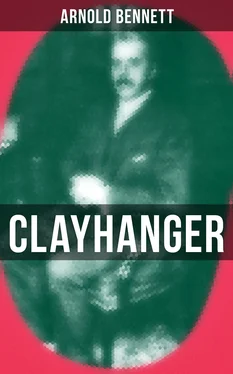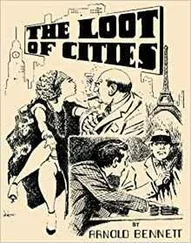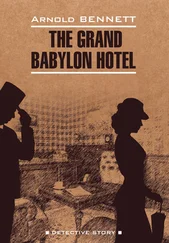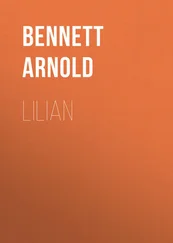And suddenly a yawn surprised him, and recalled him to the existence of his body. He thought: “I can’t really be tired. It would be absurd to go to bed.” For his theory had long been that the notions of parents about bedtime were indeed absurd, and that he would be just as thoroughly reposed after three hours sleep as after ten. And now that he was a man he meant to practise his theory so far as circumstances allowed. He looked at his watch. It was turned half-past eleven. A delicious wave of joy and of satisfaction animated him. He had never been up so late, within his recollection, save on a few occasions when even infants were allowed to be up late. He was alone, secreted, master of his time and his activity, his mind charged with novel impressions, and a congenial work in progress. Alone? ... It was as if he was spiritually alone in the vast solitude of the night. It was as if he could behold the unconscious forms of all humanity, sleeping. This feeling that only he had preserved consciousness and energy, that he was the sole active possessor of the mysterious night, affected him in the most exquisite manner. He had not been so nobly happy in his life. And at the same time he was proud, in a childlike way, of being up so late.
He heard the door being pushed open, and he gave a jump and turned his head. His father stood in the entrance to the attic.
“Hello, father!” he said weakly, ingratiatingly.
“What art doing at this time o’ night, lad?” Darius Clayhanger demanded.
Strange to say, the autocrat was not angered by the remarkable sight in front of him. Edwin knew that his father would probably come home from Manchester on the mail train, which would stop to set down a passenger at Shawport by suitable arrangement. And he had expected that his father would go to bed, as usual on such evenings, after having eaten the supper left for him in the sitting-room. His father’s bedroom was next door to the sitting-room. Save for Mrs Nixon in a distant nook, Edwin had the attic floor to himself. He ought to have been as safe from intrusion there as in the farthest capital of Europe. His father did not climb the attic stairs once in six months. So that he had regarded himself as secure. Still, he must have positively forgotten the very existence of his father; he must have been ‘lost,’ otherwise he could not but have heard the footsteps on the stairs.
“I was just drawing,” said Edwin, with a little more confidence.
He looked at his father and saw an old man, a man who for him had always been old, generally harsh, often truculent, and seldom indulgent. He saw an ugly, undistinguished, and somewhat vulgar man (far less dignified, for instance, than Big James); a man who had his way by force and scarcely ever by argument; a man whose arguments for or against a given course were simply pitiable, if not despicable. He sometimes indeed thought that there must be a peculiar twist in his father’s brain which prevented him from appreciating an adverse point in a debate; he had ceased to expect that his father would listen to reason. Latterly he was always surprised when, as to-night, he caught a glance of mild benevolence on that face; yet he would never fail to respond to such a mood eagerly, without resentment. It might be said that he regarded his father as he regarded the weather, fatalistically. No more than against the weather would he have dreamed of bearing malice against his father, even had such a plan not been unwise and dangerous. He was convinced that his father’s interest in him was about the same as the sun’s interest in him. His father was nearly always wrapped in business affairs, and seemed to come to the trifling affairs of Edwin with difficulty, as out of an absorbing engrossment.
Assuredly he would have been amazed to know that his father had been thinking of him all the afternoon and evening. But it was so. Darius Clayhanger had been nervous as to the manner in which the boy would acquit himself in the bit of business which had been confided to him. It was the boy’s first bit of business. Straightforward as it was, the boy might muddle it, might omit a portion of it, might say the wrong thing, might forget. Darius hoped for the best, but he was afraid. He saw in his son an amiable irresponsible fool. He compared Edwin at sixteen with himself at the same age. Edwin had never had a care, never suffered a privation, never been forced to think for himself. (Darius might more justly have put it—never been allowed to think for himself.) Edwin had lived in cotton-wool, and knew less of the world than his father had known at half his years; much less. Darius was sure that Edwin had never even come near suspecting the miracles which his father had accomplished: this was true, and not merely was Edwin stupendously ignorant, and even pettily scornful, of realities, but he was ignorant of his own ignorance. Education! ... Darius snorted. To Darius it seemed that Edwin’s education was like lying down in an orchard in lovely summer and having ripe fruit dropped into your mouth... A cocky infant! A girl! And yet there was something about Edwin that his father admired, even respected and envied ... an occasional gesture, an attitude in walking, an intonation, a smile. Edwin, his own son, had a personal distinction that he himself could never compass. Edwin talked more correctly than his father. He thought differently from his father. He had an original grace. In the essence of his being he was superior to both his father and his sisters. Sometimes when his father saw him walking along the street, or coming into a room, or uttering some simple phrase, or shrugging his shoulders, Darius was aware of a faint thrill. Pride? Perhaps; but he would never have admitted it. An agreeable perplexity rather—a state of being puzzled how he, so common, had begotten a creature so subtly aristocratic ... aristocratic was the word. And Edwin seemed so young, fragile, innocent, and defenceless!
Darius advanced into the attic.
“What about that matter of Enoch Peake’s?” he asked, hoping and fearing, really anxious for his son. He defended himself against probable disappointment by preparing to lapse into savage paternal pessimism and disgust at the futility of an offspring nursed in luxury.
“Oh! It’s all right,” said Edwin eagerly. “Mr Peake sent word he couldn’t come, and he wanted you to go across to the Dragon this evening. So I went instead.” It sounded dashingly capable.
He finished the recital, and added that of course Big James had not been able to proceed with the job.
“And where’s the proof?” demanded Darius. His relief expressed itself in a superficial surliness; but Edwin was not deceived. As his father gazed mechanically at the proof that Edwin produced hurriedly from his pocket, he added with a negligent air—
“There was a free-and-easy on at the Dragon, father.”
“Was there?” muttered Darius.
Edwin saw that whatever danger had existed was now over.
“And I suppose,” said Darius, with assumed grimness, “if I hadn’t happened to ha’ seen a light from th’ bottom o’ th’ attic stairs I should never have known aught about all this here?” He indicated the cleansed attic, the table, the lamp, and the apparatus of art.
“Oh yes, you would, father!” Edwin reassured him.
Darius came nearer. They were close together, Edwin twisted on the cane-chair, and his father almost over him. The lamp smelt, and gave off a stuffy warmth; the open window, through which came a wandering air, was a black oblong; the triangular side walls of the dormer shut them intimately in; the house slept.
“What art up to?”
The tone was benignant. Edwin had not been ordered abruptly off to bed, with a reprimand for late hours and silly proceedings generally. He sought the reason in vain. One reason was that Darius Clayhanger had made a grand bargain at Manchester in the purchase of a second-hand printing machine.
Читать дальше












